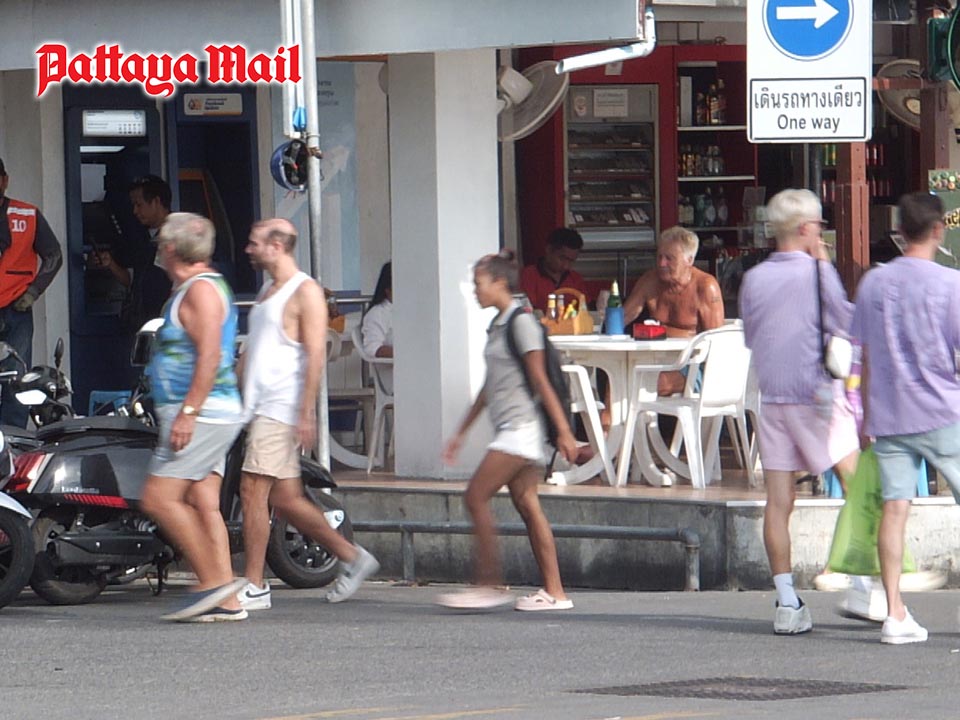Expats eager to help Pattaya fully grasp realities and fine-tune policies before it’s too late
Expats highlight issues like noise pollution, chaotic baht-bus parking, poor crossing designs, and littered footpaths—actively helping Pattaya’s authorities reshape policies for a better quality of life. (Photo – Pattaya Beach Road)
PATTAYA, Thailand – As Pattaya grapples with shifting tourism dynamics and a changing global travel landscape, voices from the long-term expat community are urging local authorities and tourism agencies to rethink and refine their strategies — before the city’s hard-won appeal slips further away.
Many expats warn that the Tourism Authority of Thailand (TAT) still doesn’t fully grasp the complex economic realities underpinning recent tourism trends. “What TAT doesn’t understand is that Indians and Chinese tourists, often touted as growth markets, are not the big spenders they’re made out to be,” says one longtime resident. “Many Chinese tourists stay in Chinese-owned hotels, eat at Chinese-owned restaurants, and travel in large tour groups controlled by Chinese companies, limiting their economic impact on the wider Thai economy.”
Meanwhile, a key factor driving the decline in Western tourists—traditionally among the highest spenders—is the strengthening Thai baht. The currency’s rise has pushed costs higher, making what was once a budget-friendly destination increasingly expensive for Europeans and Americans alike. “The strong baht has made Pattaya less affordable, plain and simple,” a local business owner notes. “Prices have gone up since the pandemic as Thais tried to recover lost revenue, but that strategy backfired, turning Pattaya into what many see as a ‘money-grabbing tourist trap.’”
Moreover, the post-pandemic surge in prices extends beyond accommodations and food. Airfares from Europe have nearly doubled compared to pre-pandemic levels, while new taxes—such as those aimed at covering costs for illegal immigrant housing—add further financial burdens on travelers. These combined factors have led to a sharp drop in Western visitors, historically the backbone of Pattaya’s tourism economy.
Beyond pricing, many expats point to the visible signs of wear and decline in once-thriving tourist spots. “Thailand has never fully recovered from the pandemic years,” an expat lamented. “Places like Lonely Beach on Koh Chang are abandoned, and backpackers disappeared even before 2020. As each tourist group fades, so do the areas built around them. Without urgent improvements, Pattaya risks following the same path.”
The quality of life for visitors and residents alike is further challenged by loud and persistent noise pollution. Pounding music spills out of Indian and local pubs late into the night, while street racing and the roaring engines of motorcycles disrupt neighborhoods. Large concerts in public areas generate loud sound that often disturbs residents, and fireworks displays add to the noise but sometimes leave behind mess and safety concerns. Meanwhile, footpaths and dustbins along Jomtien Beach suffer from neglect, littering, and overcrowding—factors that detract from the city’s beachside charm.
Adding to the daily frustrations are poorly designed pedestrian crossings that make navigating busy streets dangerous and inconvenient, and chaotic baht-bus parking that clogs key traffic routes, causing congestion and safety risks. These combined issues highlight the urgent need for improved urban planning and enforcement to protect Pattaya’s livability and appeal.
Despite these challenges, expats are not ready to give up on Pattaya. Many highlight how islands like Samui have demonstrated resilience by adapting their tourism models and investing in quality and sustainability. “Pattaya can’t lose hope,” one local expat insists. “But it needs smart, inclusive policies that recognize the real spending habits of different tourists, address pricing concerns, and prioritize infrastructure and safety improvements.”
The message from the expat community is clear: Pattaya’s future depends on listening carefully to all stakeholders, especially those who live and work here year-round. By fine-tuning policies now, the city can safeguard its unique appeal and avoid repeating mistakes that risk alienating valuable visitors and residents.
As one expat bluntly put it, “No one is stopping anyone from coming here and spending their life savings—but if Pattaya wants long-term success, it needs to stop chasing short-term profits and start building a sustainable, welcoming future.” (Photo by Jetsada Homklin)



